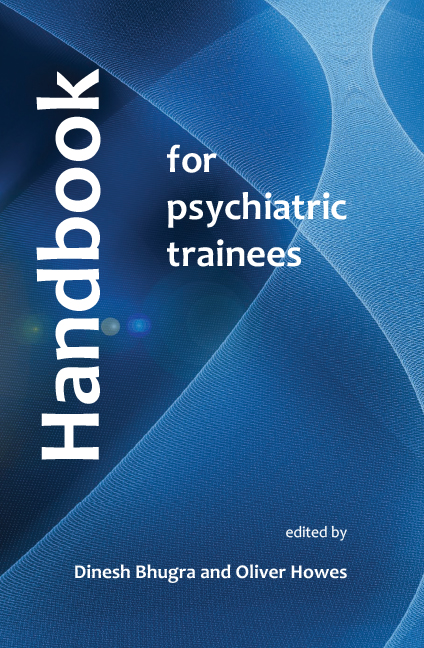Book contents
- Frontmatter
- Contents
- List of tables, boxes and figures
- List of contributors
- 1 Psychiatric training: the next steps
- Part 1
- Part 2
- Part 3
- 14 Personal safety
- 15 Managing violence
- 16 Managing difficult clinical situations
- 17 Understanding and managing stress
- 18 Managing time: the key to professional success
- 19 Negotiation skills
- 20 Presentation skills
- 21 Mental health review tribunals: reports and hearings
- 22 How to get published
- 23 Mental health informatics
- 24 Clinical governance
- 25 Lifelong learning and revalidation
- 26 Mentoring and shadowing
- 27 The MRCPsych examinations
- 28 Flexible training
- 29 UK training for overseas doctors and opportunities for UK doctors to train outside the EEC
- 30 Academic careers
- 31 Higher degrees
- Index
31 - Higher degrees
from Part 3
- Frontmatter
- Contents
- List of tables, boxes and figures
- List of contributors
- 1 Psychiatric training: the next steps
- Part 1
- Part 2
- Part 3
- 14 Personal safety
- 15 Managing violence
- 16 Managing difficult clinical situations
- 17 Understanding and managing stress
- 18 Managing time: the key to professional success
- 19 Negotiation skills
- 20 Presentation skills
- 21 Mental health review tribunals: reports and hearings
- 22 How to get published
- 23 Mental health informatics
- 24 Clinical governance
- 25 Lifelong learning and revalidation
- 26 Mentoring and shadowing
- 27 The MRCPsych examinations
- 28 Flexible training
- 29 UK training for overseas doctors and opportunities for UK doctors to train outside the EEC
- 30 Academic careers
- 31 Higher degrees
- Index
Summary
In this brief chapter, I consider what role, if any, a higher degree plays in psychiatric training in the UK. It is written from the viewpoint of a chair of a local PhD committee. It is worthwhile taking a little time to consider this, since undertaking a PhD essentially means that you will spend 3 years full time (or 6 years part time) writing a 60 000-word book that perhaps only two people ever really read: and one of those will be you, but more of this later.
First, we need to define what we mean by a higher degree. If there are ‘higher’ degrees, then there are presumably ‘lower’ degrees, and in medicine there are none lower than the basic medical qualifications Bachelor of Medicine and Bachelor of Surgery (abbreviated as MB BS, MB BChir, etc). These are not higher degrees but they do deliver one of the only tangible benefits and incentives of completing a higher degree, in that they confer the (honorary) title of ‘doctor’. In Germany you can use the title ‘Dr Dr’ if you are a medical doctor with a higher degree, but in the UK you do not get an extra title and the only use of ‘Doctor Doctor’ is as a start to a set of some of the very worst jokes ever composed.
Next there are master'sdegrees such as Master of Science (MSc), Master of Arts (MA) and Master of Medical Sciences (MMedSci). In the UK these are most commonly 1-year full-time (or 2-year part-time) taught degrees, involving lectures, examination and the completion of a short dissertation, which may well involve a small amount of (usually pointless) original research. Some Scottish Universities give an MA as their basic degree, while Oxford and Cambridge will sell you one for a very reasonable price if you just make it through their undergraduate courses. Taught MScs are often an excellent way of gaining a greater depth of understanding of a specific subject and can help to differentiate a candidate from a crowd at interview, but they are also not ‘higher degrees’ in the sense we mean it here.
Finally, there are ‘higher degrees proper’. There are doctorates available across the academic spectrum, and the PhD (Philosophiæ Doctor or Doctor of Philosophy) is the general research doctorate available throughout arts and sciences, including medicine.
- Type
- Chapter
- Information
- Handbook for Psychiatric Trainees , pp. 317 - 323Publisher: Royal College of PsychiatristsPrint publication year: 2008



